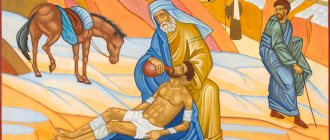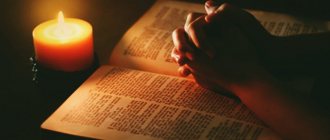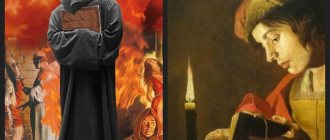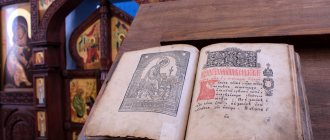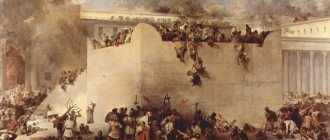This article uses Hebrew (Masoretic). numbering of psalms. Psalm 81 in Greek (Septuagint or Vulgate) numbering corresponds to Psalm 82 in Hebrew numbering.
| Psalm 81 | |
| “Sing to God, our strength!” | |
| Psalm 81 (Psalm 80 in the Vulgate) from Psalter of Eleanor of Aquitaine (about 1185) - KB 76 F 13, sheet 103v | |
| Another name | Exultate deo adiutori nostro, iubilate deo Jacob |
| Text | Psalm of Asaph |
| Language | Hebrew (original) |
Psalm 81
Psalm 81 in the biblical Book of Psalms.
Its themes relate to celebration and repentance. in the New King James Version its subtitle is “A Call to Israel's Repentance.”[1] In the Greek Septuagint version of the Bible, and in its Latin translation in the Vulgate, this psalm is Psalm 80
in a slightly different numbering system.
Text
Hebrew Bible Version
The following is the Hebrew text of Psalm 81:[2]
| Poem | Hebrew |
| 1 | לַֽמְנַצֵּ֬חַ | עַל־הַגִּתִּ֬ית לְאָסָֽף |
| 2 | Please contact us ב |
| 3 | Home page |
| 4 | Home page |
| 5 | Please contact us |
| 6 | עֵ֚דוּת | Please contact us ֹֽא־יָדַ֣עְתִּי אֶשְׁמָֽע |
| 7 | Please contact us נָה |
| 8 | ם אֶבְחָֽנְךָ֨ עַל־מֵ֖י מְרִיבָ֣ה סֶֽלָה |
| 9 | Home page ֽי |
| 10 | לֹֽא־יִהְיֶ֣ה בְ֖ךָ אֵ֣ל זָ֑ר וְלֹ֥א תִֽ֜שְׁתַּֽחֲוֶ֗ה לְאֵ֣ל נֵכ ָֽר |
| 11 | אָֽנֹכִ֨י | Please contact us ִּ֜֗יךָ וַֽאֲמַלְאֵֽהוּ |
| 12 | וְלֹלִ֑י וְ֜יִשְׂרָאֵ֗ל לֹא־אָ֥בָה לִֽי |
| 13 | Home וֹתֵיהֶֽם |
| 14 | Please contact us |
| 15 | Home ִֽי |
| 16 | Please contact us |
| 17 | Please contact us עֶֽךָּ |
King James Version
Below is the complete English text of the Psalm from the King James Bible.
To the chief musician of Gittit,
Psalm
of Asaph.
- Sing to God our strength; shout joyfully to the God of Jacob.
- Take a psalm and bring a tympanum, a pleasant harp with a psalter.
- Blow the trumpet on the new moon, at the appointed time, on our solemn holiday.
- For it was a decree for Israel and a law for the God of Jacob.
- This he set in Joseph for a testimony when he walked through the land of Egypt: where I heard a language that I did not understand.
- I took his shoulder off the burden: his hands were removed from the pots.
- You caused trouble and I delivered you; I answered you in the secret place of thunder: I tested you on the waters of Meribah. She sat down.
- Hear, my people, and I will testify to you: O Israel, if you listen to me;
- There will be no foreign god in you; and do not worship any foreign god.
- I am the Lord your God, who brought you out of the land of Egypt; open your mouth, and I will fill it.
- But my people did not listen to my voice; and Israel would not want me.
- I gave them over to the lusts of their hearts, and they did according to their own counsels.
- Oh, that my people would listen to me, and that Israel would follow my ways!
- I was soon to subdue their enemies and turn my hand against their enemies.
- Those who hated the Lord should have submitted to Him, but their time should have been eternal.
- He had to feed them also with the best of wheat; and with honey from the rock, if only I could satisfy you.
Numbering of verses
in the Hebrew Bible, Psalm 81:1 contains a designation
for the Chief Musician of Gittit,
the Psalm
of Asaph.
(KJV)
From this point on, Psalm 81:1–16 in the English version corresponds to verses 2–17 in the Hebrew text.
We read the Psalter. Psalm 81
Audio |
Conversation with Archpriest Alexy Ladygin about the Psalter.
Dear brothers and sisters, we continue to study the Psalter and today we will talk about the 81st Psalm. It has the inscription: psalm to Asaph, 81. An amazing psalm. Here the psalmist David prophesies about the Jewish people - about how the Lord was pleased to give judges to this people, and if the people do not live according to the Law of God, then all grace and power are taken away from them, they become rejected, and everything that the Lord gave them is given away to that people who are ready to keep the truth and be faithful to the Lord. “God is in the assembly of gods, but in the midst the gods will judge.” Why does the psalmist say such words? We have one God. In the assembly of which gods did He stand? The Lord calls the chosen Jewish people gods. The Lord calls judges and rulers gods, to whom he gives special power and care for the people. Only God can judge a person, because God is the Creator, the Giver of all goods, and He has the right to judge, to give the correct assessment. But so that there are no offended people on earth, so that someone can intercede for people, God gives His right to judge to rulers and judges, of course, with the hope that they will observe the Law of God. This is why in ancient times all legislation was developed in accordance with the Holy Scriptures - laws were adopted not as a person wanted, not as a person saw a certain structure or punishment for a certain crime, but every act was measured against the Law of God.
A person by himself cannot judge anyone - he has no such power, no such right. And if there are rulers, judges, then only by the command of God, God gave them certain of His rights, so that they would do this, but do it righteously, as the Lord would do if he were among us. And if a person who has such power from God does not do this in truth, then God will judge such a person. “In the midst the gods will judge,” that is, among the people themselves, the Lord will answer such a person for committing unrighteous deeds. And here we talk about the role of a judge in general: what he should do, how to carry out legal proceedings, and treat those who come to him for help. And here I would like to say once again that any legislation should be structured exactly as the Lord tells us - through the prism of Holy Scripture.
“How long will you judge unrighteousness and accept the faces of sinners?” Here the Lord, through the psalmist, denounces the judges who are given to protect the poor, the needy, the one who is offended in this life. However, judges can be partial: they look at the face, at the position and protect sinners, thereby committing great lawlessness. That is why, since ancient times, there has been such a strong responsibility on the judge. A judge must always be a righteous person and have a righteous approach to his work, to his obedience; this is not ordinary obedience, but obedience from God Himself - the rights of the Lord Himself are entrusted to him.
“Judge the poor and the poor, justify the lowly and the needy; purge the poor and the needy, deliver them from the hand of the sinner.” The Lord especially pays attention to the fact that those who have no protection in this life are judged with justice. Siru is an orphan: he is left alone, he does not have a strong hand that would not give him offense. That is why judges are appointed, who must first of all be on the side of the orphan, and not of the sinful and lawless person who wants to offend him. “Justify the poor, the humble and the poor” - the one for whom there is no one to intercede. This, of course, includes widows: they, as a rule, are the most vulnerable, they are very often offended, there is no one to stand up for them, they have lost all support and hope in this life - these are the most vulnerable segments of the population, and they need help. And if there is no one among the people, then the Lord has appointed His governors, judges, so they must strive in every possible way to protect the orphan, the widow, the humble, the beggar, and the wretched.
Moreover, the Holy Scripture gives a certain division: a beggar is a person who was rich and became poor. Not everyone who has wealth remains rich for the rest of their life. Wealth, like sand in the hand, disappears very quickly, and at any moment a person can become a beggar in need of this life. It is for such a person, who was once rich, but is now impoverished and cannot stand up for himself, that the judge must stand up. And a poor person is one who earns money for his food, and has no other means for anything; It’s as if he doesn’t need alms, but he can’t hire a lawyer or show strength in this society - it only accepts material wealth. So the poor person also remains defenseless.
And Holy Scripture tells us that a judge should not so much reveal the truth as be a defender of the defenseless in this life. And the law should be designed to protect the most vulnerable, not those with dignity. The Holy Scripture does not say that a judge must protect a ruler, a prophet or a priest: it is prescribed that they should be given honor and obedience. They can tolerate some untruth in their lives, this is given to them for spiritual elevation, because everything else is on their side. The judge fulfills the law that he must protect the most vulnerable in this life, to whom it is very easy to blame any untruth, any lawlessness, and they will not be able to justify themselves in this life. Life doesn’t spoil them anyway, they are in constant lack, life itself is already punishing them, and it’s a sin to punish such people once again.
Therefore, the Lord gives judges and makes demands on them. This is very correct when a judge remains free, so that no state system can put pressure on him, and city governors do not dictate their will. At the same time, the judge must be a highly moral person, religious, if you like, knowing the Holy Scriptures: in order to understand what his role and responsibility is not only before society, but also before Heaven: not only society has endowed you with such a right, but, firstly turn, the Lord established the institution of judges on earth, He shared His own right. And first of all, you will be responsible before Him. This responsibility is so great... It lies with the judge, it lies with the person who is in charge in society, whether he is the head of a religious society, a secular society, some kind of organization, some kind of enterprise, a factory. The judge has the responsibility to make a correct trial. And in order to accomplish it, you need to approach the task that is offered to you correctly: without having any internal prejudices, attachments or internal hostility towards this or that person. It is very important for a judge and a commander to have dispassion, so that there is no partiality towards a person: then it is very easy to unjustly condemn or evaluate a person’s works. No matter how you internally satisfy yourself, your opinion, you will never satisfy the Law of God. But God's Law is completely different.
Here we see how subtly the Lord has built this system: He allows the judge not to seek the truth between the poor and the rich, between a person who occupies a special place in this society and one who does not have patronage or protection. Judges are precisely given in order to protect those who have no protection in life, who are truly vulnerable from the powers of this age. This is the demand put forward by the Lord to the judicial system itself.
I think that every judge should especially know this psalm and pay attention to the words that the Lord gives through the prophet David, and devotes an entire psalm to discussions about judges. He says: if you do wrong, there will be consequences, and not only in the fact that you will be responsible for this at the Last Judgment, but also in earthly life, and they are terrible not only for you as a judge, but for the entire people, for the whole society. That is, a judge has such a huge responsibility: he judges not ordinary people, but the people of God. Here the psalmist speaks directly about the people of Israel, but, of course, he also prophesies about the Christian people: both the chosen people and the Christian people are called gods by grace - a people who cannot become gods in essence, but by grace, by the qualities that the Lord endows man, he can become like him, because man is created in the image and likeness of God.
“They walk without knowledge, without understanding, they walk in darkness; let all the foundations of the earth move.” Here there is already a denunciation from the psalmist: “You have not recognized the will of God and have not understood it, therefore you walk in darkness, you do not understand why the Lord has put you, you continue to live the way the entire secular world lives. You protect the mighty of this age, you help to increase their wealth, taking away the last from those who do not have, you inflict insult and sorrow on widows and orphans, although you should take their side.”
Unfortunately, this darkness comes not only from judges, but also from those in authority. Here the Lord makes a certain connection: we do not have a free judge, he depends on the commander. In our society, both political power and state power indicate to judges: as they say, the judge should decide; he is given a small amplitude of decision-making, but he must not exceed its boundaries. If the judge sees a lie, when it is necessary to show mercy to help save a person (for example, not to deprive a widow of her only son, to somehow alleviate her suffering - she cannot present anything to the court to protect her child, who is already in great sorrow : a widow has one child and, perhaps, somewhere she did not give everything completely to raise or keep the child from some frivolous offense for which he could have received a lighter punishment), in our society not every judge can show such a soft decision - there is no freedom, there is a “direct instruction”, and if a judge makes a decision that does not agree with those internal standards or certain punishments, then he is summoned to the panel of judges, punished or deprived of the right to be a judge.
The psalmist speaks about this here: “...without knowledge, without understanding, they walk in darkness” - they cannot make a decision. And they walk in the darkness, making a completely different decision: they protect those who should be punished, who take away the last, and bring guilt against those who need to be protected. Such decisions are completely contrary to the design and grace that God has given to human society by giving certain people His Divine authority to judge and evaluate the actions of man. For this, not only the judge is punished, but the entire earth and human society. The psalmist speaks very well about how they are punished: “... let all the foundations of the earth move.” Even if judges commit untruths, then we cannot find the truth anywhere: judges are the judicial representatives of God on earth, and if they commit untruths and lawlessness, then this causes changes in nature itself, and human society begins to suffer. This is one of the reasons that many cataclysms and sufferings occur on earth, and as they increase, we can say how much evil on earth increases, how much judges become unrighteous and judge people not according to the truth - neither God's nor even human.
“Az reh: you are gods, and you are all sons of the Most High.” The psalmist speaks beautiful words through the Lord, saying in the words of the Lord: you are gods, and all are sons of the Most High. Here is an appeal to all the people! “Consider who you are: not just an ordinary people, you are a chosen people.” We say about the Old Testament people that they are the chosen ones. If we are talking about Christians, they are also the chosen people. And the Lord calls us not just His servants, He says: you are gods, you have the abundance of God’s grace, the image and likeness of God, you are all sons of the Most High. And if we are children of God, then we must strive to maintain in ourselves the image and likeness of God: we must strive to live in truth, in fulfillment of the Law of God, to work on ourselves day and night, so that our holiness is what whitens us and does not lead us to judgment, but justifies without trial if we have worthily carried our special title with which the Lord has endowed us. But with us the opposite happens. Therefore, the psalmist further writes:
“You, like men, are dying, and like only princes you are falling” - like ordinary people who have not known God, to whom Christ has not been revealed, who live according to their own will, according to their passions, not recognizing anything Divine in their lives, being busy with earthly affairs , you are dying. All human pride and passions are so captivating, that’s why their death is terrible, and punishment is coming, and the Last Judgment will be inevitable. So He says, “How are you different? I gave you such a high title, I called you gods, I called you sons of the Most High, but you live like ordinary people and die like sinners, and not as those who know God and serve Him.” For you alone fall from princes - who alone falls from princes? Who was the great ruler? Dennitsa was higher than all the angels - they obeyed him, and because of his pride he fell. This is how we are: if we have human pride, we fall like one of the princes - we become like the enemy of the human race and violate the plan, we do not follow Christ, Who suffered for our salvation.
And the psalmist ends this psalm with amazing words:
“Rise up, O God, judge the earth: for you are the inheritor of all nations.” David is already talking about the resurrection of Christ, he asks that Christ rise again and through His apostles bring judgment on this world, on the prince of this world, so that there will be victory over the enemy of the human race, who carries everyone along with him - and those whom the Lord has chosen for Himself , makes ordinary people die an ordinary death. The psalmist asks that the Lord come and carry out Judgment - righteous judgment is already upon all the nations of the earth, as You have brought upon all nations. The inheritance of Christ is all those who believe in Him and do the will of God, says John Chrysostom.
This is such an amazing psalm, dear brothers and sisters, that the psalmist offers us, with very deep reasoning, very important, especially for our modern life. It is probably also important for statesmen who manage the entire state system: on the one hand, there is legal law, there are state, political approaches to certain aspects of life. But we must never forget that there is also the Law of God and the commandments of God. And the structure of social life that we have is created not only by some democratic or historical approaches to our life, but precisely according to the Biblical history of the life of the people whom the Lord chose and who Himself led along the paths of this life, and showed how to approach one or another issue, whom He has endowed with what rights, what responsibility a person bears, what direction he should take in his activities. When all this is brought into accordance with the Law of God, then life on earth will be pacified, then nature will live in harmony with us, and there will be no problems that we constantly face.
God bless you all, dear brothers and sisters, and, God willing, see you again!
Recorded by Nina Kirsanova
A comment
The reference to the new and full moon and the sound of the trumpet in verse 3 may reflect the celebration of the New Year and Tabernacles.[3] The teaching in verses 9-10 is similar to the beginning of the Decalogue, although "the words for 'foreign' god and 'foreign' god differ from 'other gods' in Exodus 20 and Deuteronomy 5 by the verb 'raised [you] up' and the reverse order of the phrases.[ 3]
The beginning of the psalm is like a hymn (verses 1–5b), followed by an oracle (verses 5c–16). Specifically, verses 6-10 describe "the deliverance of God's people from Egypt," while verses 11-16 recall the people's past disobedience and promise victory over their enemies if they obey God.[3]
Happy Festivals 5716 stamp - 60 mil - Ram's horn with inscription on the inlay: "Blow the trumpet at the new moon, at the appointed time, on our solemn holiday" Psalm 82:4.
- The psalm is read in full on Shir Shel Yom of Thursday.[4]
Robert Godfrey, Sinclair Ferguson and several others make it the poetic center of the Psalter, being the middle book (book 3 of 5), the middle psalm (8 of 17) and even pointing to the middle verses of this Psalm (Psalm 81:8, p. 9 with words “If only my people would listen.”[5]
Interpretation
The judges condemn the verses of Psalm 81 with emotion. Each verse by the author includes an address to judges and other influential people in Israel.
- Verses 2-5: Asaph repeats that judges are called “gods” because God’s will comes from them and they judge according to the law given by God. So they reason according to justice, and not according to their own understanding, in order to have mercy on the innocent poor, but to punish sinners. In verse 5, the author emphasizes that judges know and understand everything well, but are subject to the temptation of sin. That is why they undermine the foundations of civil society and benefit arbitrariness and violence.
- Verses 6-7. The author talks about God's warning about unjust judges. Although they were elected, they will be deposed for their sins, like all rulers who fail to fulfill their responsibilities.
- Verse 8: The last verse contains a call to the Supreme Judge and a call to bring justice not only to the Israelites, but to all His children.
- Verse 1: The author reminds us that God is the supreme judge, judging the “army of gods” that he who holds the power defines himself. Asaph reminds us that the judges of the earth were appointed by God and not by anyone else.
Uses
Judaism
- Recited on Rosh Hashanah in some traditions.[6]
- Read on the sixth day of Sukkot in some traditions.[7]
- Verse 2 is part of the Mishnah. Tamid 7:4.[8]
- Verse 3 is part of the blessings before the Shema on the second day of Rosh Hashanah.[9]
- Verses 4-5 refer to daytime. Kiddush on Rosh Hashanah.[10]
- Verse 5 is found in the Mussaf Amidah for Rosh Hashanah.[11]
- Verse 11 is the seventh verse of Hoshia Et Amecha in Pesukei Dezimra.[12]
Music settings
Verses 1-4 were set by Adrian Batten in a sacred hymn called "Sing Joyfully".[13]
References
- New King James Version
- "Teillim - Psalms - Chapter 81." Chabad.org. 2022. Retrieved January 26, 2022.
- ^ a b c
Rodd, S. S. (2007).
"18. Psalter." In Barton, John; Muddiman, John (ed.). Oxford Bible Commentary
(first (paperback) ed.). Oxford University Press. p. 389. ISBN 978-0199277186. Retrieved February 6, 2019. - The Complete Artscroll Siddur page 166
- https://www.ligonier.org/learn/series/learning-love-psalms/psalm-81-word-center/
- The Artscroll Tehillim page 329
- The Artscroll Tehillim page 329
- The Complete Artscroll Siddur page 479
- Complete Artscroll Machzor for Rosh Hashanah, page 273
- Complete Artscroll Siddur, page 493
- Complete Artscroll Mahzor scroll for Rosh Hashanah, page 458
- The Complete Artscroll Siddur page 64
- "O Sing Joyfully (Adrian Batten)." CPDL
. Retrieved June 14, 2022.
